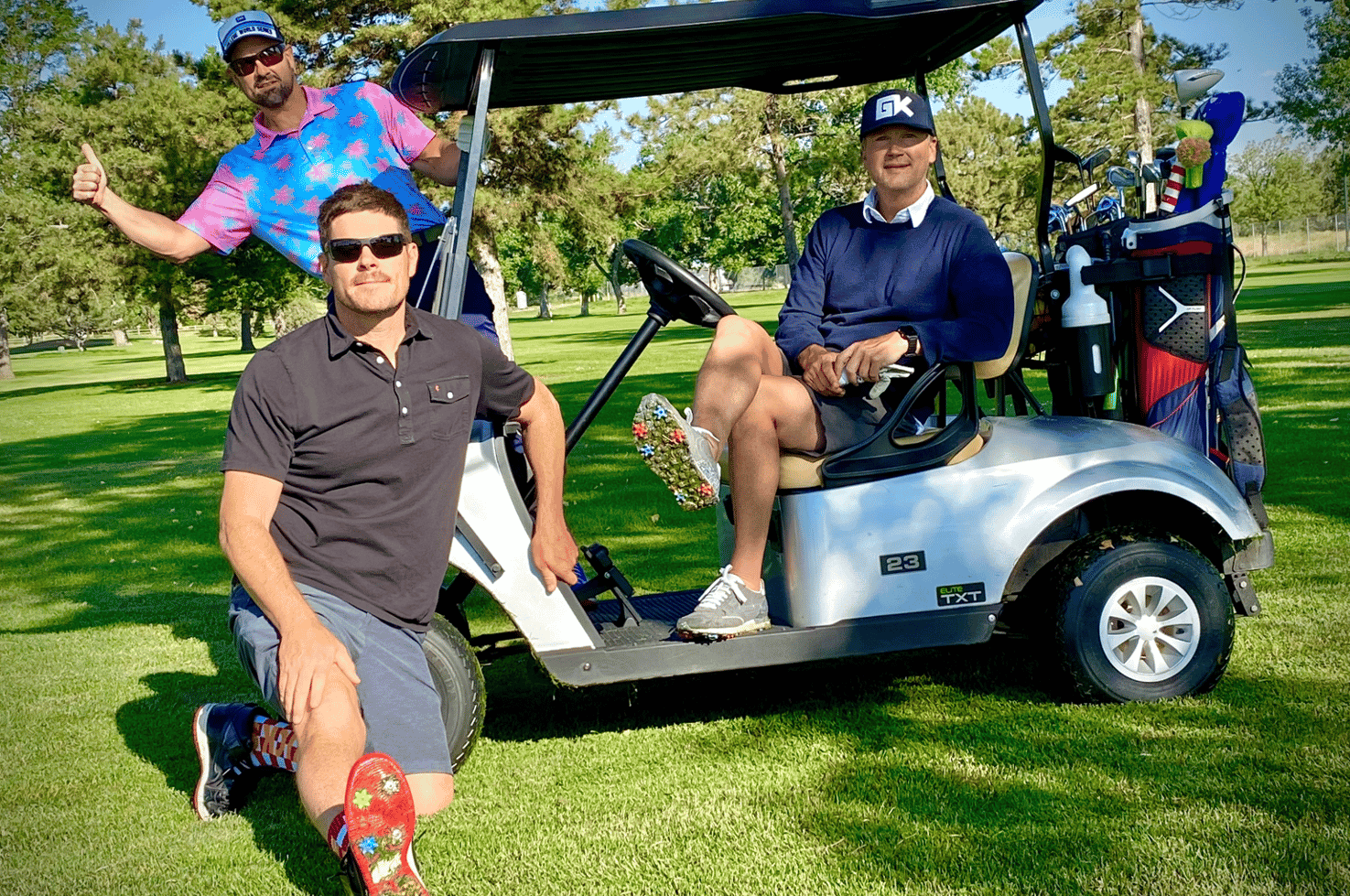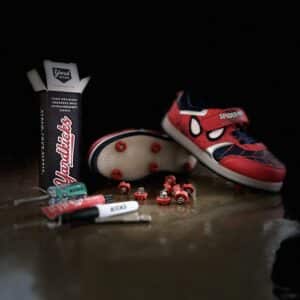
Golfkicks founders Ty Stuart, front, Matt Mockus, back right, and John Krosky, back left, show off their product. (Photos courtesy of Golfkicks)
The founders of a company whose screw-on spikes make any shoe appropriate for the golf course are taking a swing at a new product for field sports.
Ty Stuart, co-founder of Golfkicks, said the company just finished its pilot program for Yardkicks, a similar product with smaller spikes that turn any shoe into cleats fit for traditional team sports.
“They are really hot with little leaguers, kids and softball and baseball beer leagues,” Stuart said. “The fact that it works in almost any field sport, I think it could be real big.”
The company sold about 2,000 Yardkicks kits in its test run. After some design tweaks, the product will fully launch in June, retailing for $30.
The company is working on raising $900,000 for the launch and marketing efforts. So far it’s raised $500,000, according to Stuart.
Stuart founded Golfkicks in a garage with his buddies, John Krosky and Matt Mockus, in 2018. The trio wanted to bring style to the golf course and were unsatisfied with the available golf shoes.
Since launching, Golfkicks have been featured on Shark Tank — the founders agreed to a deal with Mark Cuban, but it ultimately wasn’t signed — as well as patented and worn in the PGA Tour by Scott Stallings.
“We brought this new thing into the world, it’s really cool, people are using it at the professional level, we’ve done millions of dollars in sales and we’ve got the patent, now we’re launching baseball – this is what we set out to achieve,” Stuart said.
Every Golfkicks and Yardkicks traction kit comes with a pack of 20 spikes, a sharpie to mark where the screws will go, shoe glue, a drill bit and screwdriver.
“Screw them in and abracadabra you have cleats,” Stuart said.
About half of sales come in through Amazon, 40 percent through the company website and the other 10 percent through retail stores, according to Stuart. The kits are sold at Scheels, PGA Tour shops, airports and internationally in South Korea and Japan. They’re available online in Europe.
Golfkicks are priced at $32.99 and cost about $9 to make, while Yardkicks cost about $8 to make.
The company is on track for its first profitable year, Stuart said, expecting more than $2 million in revenue from both Golfkicks and Yardkicks products. It wrapped up 2022 with about $1.5 million, which was $300,000 more than 2021.
“Some days I’m like ‘Oh my god, I don’t need to see another golf spike the rest of my life,’ so it’s fun to start working on baseball,” Stuart said.
Both products are manufactured in China by Pride Sports, but are assembled in and sent out from Colorado.
While Stuart said starting this business has been fun, the end goal is to sell to a large company like Nike that could do more in advertising.
“We’re not good enough at golf to stay in this business for 10 years,” Stuart said. “It has all sorts of positives for a bigger brand – keeping shoes out of landfills, upcycling old shoes, economics for people who can’t afford baseball shoes or golf cleats.”

Golfkicks founders Ty Stuart, front, Matt Mockus, back right, and John Krosky, back left, show off their product. (Photos courtesy of Golfkicks)
The founders of a company whose screw-on spikes make any shoe appropriate for the golf course are taking a swing at a new product for field sports.
Ty Stuart, co-founder of Golfkicks, said the company just finished its pilot program for Yardkicks, a similar product with smaller spikes that turn any shoe into cleats fit for traditional team sports.
“They are really hot with little leaguers, kids and softball and baseball beer leagues,” Stuart said. “The fact that it works in almost any field sport, I think it could be real big.”
The company sold about 2,000 Yardkicks kits in its test run. After some design tweaks, the product will fully launch in June, retailing for $30.
The company is working on raising $900,000 for the launch and marketing efforts. So far it’s raised $500,000, according to Stuart.
Stuart founded Golfkicks in a garage with his buddies, John Krosky and Matt Mockus, in 2018. The trio wanted to bring style to the golf course and were unsatisfied with the available golf shoes.
Since launching, Golfkicks have been featured on Shark Tank — the founders agreed to a deal with Mark Cuban, but it ultimately wasn’t signed — as well as patented and worn in the PGA Tour by Scott Stallings.
“We brought this new thing into the world, it’s really cool, people are using it at the professional level, we’ve done millions of dollars in sales and we’ve got the patent, now we’re launching baseball – this is what we set out to achieve,” Stuart said.
Every Golfkicks and Yardkicks traction kit comes with a pack of 20 spikes, a sharpie to mark where the screws will go, shoe glue, a drill bit and screwdriver.
“Screw them in and abracadabra you have cleats,” Stuart said.
About half of sales come in through Amazon, 40 percent through the company website and the other 10 percent through retail stores, according to Stuart. The kits are sold at Scheels, PGA Tour shops, airports and internationally in South Korea and Japan. They’re available online in Europe.
Golfkicks are priced at $32.99 and cost about $9 to make, while Yardkicks cost about $8 to make.
The company is on track for its first profitable year, Stuart said, expecting more than $2 million in revenue from both Golfkicks and Yardkicks products. It wrapped up 2022 with about $1.5 million, which was $300,000 more than 2021.
“Some days I’m like ‘Oh my god, I don’t need to see another golf spike the rest of my life,’ so it’s fun to start working on baseball,” Stuart said.
Both products are manufactured in China by Pride Sports, but are assembled in and sent out from Colorado.
While Stuart said starting this business has been fun, the end goal is to sell to a large company like Nike that could do more in advertising.
“We’re not good enough at golf to stay in this business for 10 years,” Stuart said. “It has all sorts of positives for a bigger brand – keeping shoes out of landfills, upcycling old shoes, economics for people who can’t afford baseball shoes or golf cleats.”

